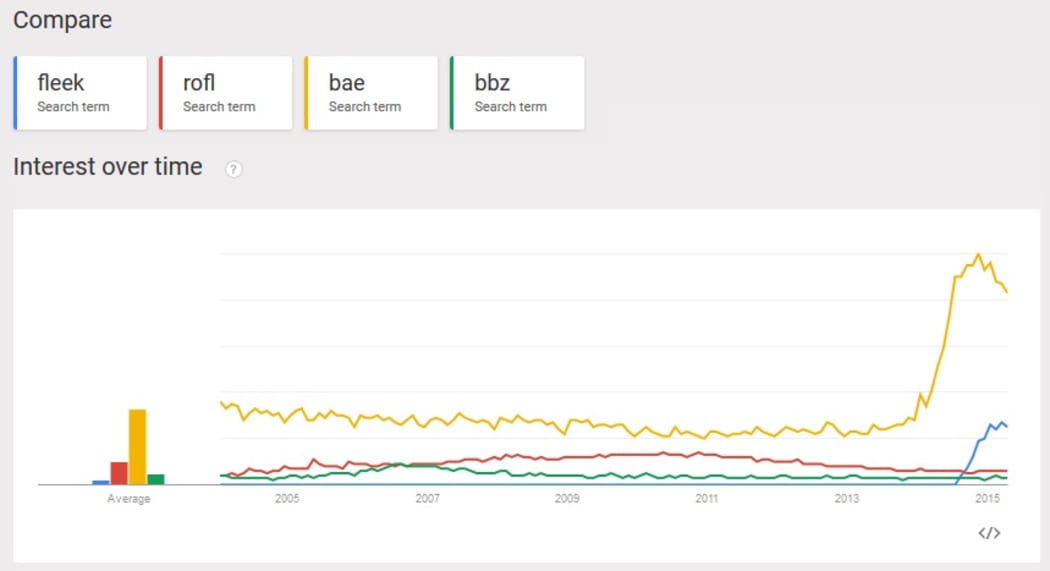A language expert from University College London has attributed rapid changes in the English language to social media and instant messaging.
Professor John Sutherland from University College London, one of the UK's leading English language experts, carried out the study in conjunction with technology giant Samsung.
He said there was a "seismic generational gap" between older and younger generations when it came to how modern informal language was used.

A graph from Google Trends, showing how some terms have become more or less popular over time. Photo: Supplied
Top ten new uses of social media language
- Fleek - Looking good
- FOMO - Fear of missing out
- Bae - A term of affection
- ICYMI - 'In case you missed it'
- Deadout - Rubbish or tired
- TBT - Throwback Thursday (often written as a hashtag, accompanying old photographs)
- LMK - 'Let me know'
- RN - Right now
- Thirsty - Looking for attention
- NSFW - Not safe for work, generally denoting rude or explicit content
Parents had the most difficulting defining terms such as 'fleek' or 'bae', with around 40 percent selecting it as a term they had never heard before, while only 10 percent of the 2,000 identified could correctly define it.
Professor Sutherland's study into common social media and "text speak" terms found that most parents were baffled by the language used by their children, with 86 percent of parents saying their children spoke an entirely different language on social media sites.
My generational divide: The words "fleek" and "bae" are stupid and there's no one who can convince me otherwise.
— Julian Burrell (@Julian_Burrell) April 30, 2015
The speed at which new uses of social media language spreads may be in part attributed to the volume of different people younger generations are able to contact.
The demographic of Facebook users has shifted, with younger people preferring to use services like tumblr, a blogging platform, Instagram, a photo-sharing app, or Yik Yak, to talk to people all over the world.
Yik Yak is currently the sixth most popular social media app in New Zealand, with an average user age of about sixteen. Users post on it anonymously, and are able to see and vote on other "Yaks" created within a 10 mile radius.

A screenshot from Yik Yak, using a cat emoji. Photo: Supplied
The speed at which new posts appear and disappear on the app may have some responsibility for the speed at which new terms become adopted by young people.
The popularity of emojis has also had a substantial change on how langauge changes. Professor Sutherland said that their rise could make for the next phase in language and communication, and that the increasing use of icons had an historical link.
We are moving to a more pictographic form of communication with the increasing popularity of the emoticon, he said.
He added: "The limitation of characters on old handsets were a key factor in the rise of acronyms in text messaging such as TXT, GR8 and M8.
"However, technological evolution has meant that these words are now effectively extinct from the text speak language and are seen as 'antique text speak'."
Top ten now defunct forms of text-speak
- TXT - Text
- GR8 - Great
- M8 - Mate
- BRB - Be right back
- ROFL - Rolling on the floor laughing
- BBZ - Babes
- L8RZ - See you later
- GTG - Got to go
- Enuf - Enough
- TTYL - Talk to you later

